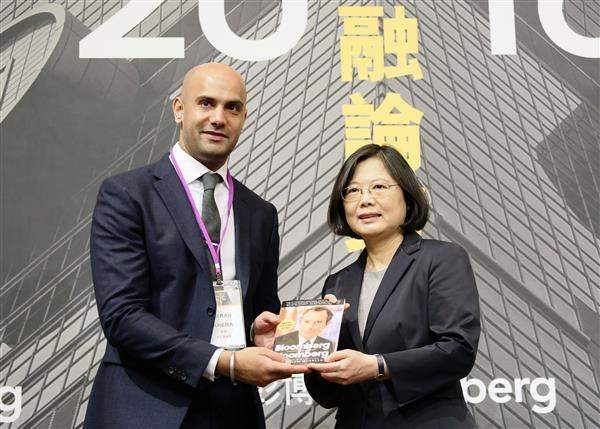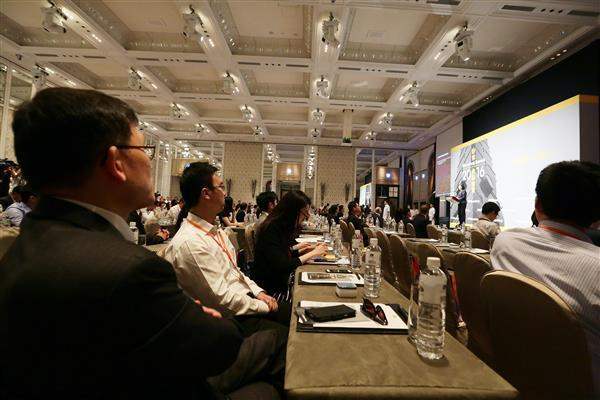News & activities
 News releases
News releases
2016-07-20
President Tsai attends Bloomberg's Taiwan Financial Summit 2016
On the afternoon of July 20, President Tsai Ing-wen attended the Bloomberg's Taiwan Financial Summit 2016, where she described the measures adopted by the government to increase domestic willingness to invest. In her remarks, the president stressed that the public and private sectors will together face the risks of innovation and help Taiwan renew its economic fortunes.
The following is a translation of the president's remarks:
I took office as president exactly two months ago today. Since then, changing political and economic conditions throughout the world and a number of problems here in Taiwan have caused a degree of unease in the business community and among the public at large. I am keenly aware of just how strongly everyone is hoping to see the government stimulate the economy and implement reforms. I fervently hope, moreover, that the joint efforts of the public and private sectors will quickly revive our flagging economy and keep the pain of this transitional period to a minimum.
A country's economic confidence is invariably reflected in the state of its financial markets and industrial development. Our investors and securities firms get worried when trading volume contracts, savers are hurt by falling interest rates, and banks are troubled by excess money supply. Our excessive domestic savings rate continues to rise each year even as weak corporate investment falls yet further. Domestic innovation and entrepreneurship lacks momentum, and the pace of industrial transformation and upgrading is slow. In the face of such issues, conventional monetary and fiscal policies will do little to improve the economy, and they might even exacerbate structural problems.
That's why we need a new set of structural reform initiatives aimed at both the financial and the industrial aspects, to fundamentally restructure the domestic economy. In particular, we need to strengthen the functions of our capital markets so that they channel capital into substantive investments that will support industrial innovation and transformation. That is the only way to break through the bottleneck that is now impeding economic development.
The new administration's philosophy is very clear. At the current stage, our efforts to stimulate the economy will focus principally upon spurring domestic willingness to invest and advancing industrial innovation, and on using financial innovation and the gathering of talent to support structural adjustments and innovative activities. There is a tremendous amount of idle capital in our financial system. If we can take this capital and channel it toward substantive and productive investments, we will be able to create more job opportunities, lift wages, and provide savers with better returns.
The government's number one responsibility is to make companies more willing to invest. We will do everything possible to eliminate barriers to investment. We will continue helping companies to acquire land and obtain stable supplies of water and electricity. We will build necessary infrastructure and take measures to attract international talent. And we will create a high-quality investment environment. The government can also cooperate with the private sector, such as forming public-private partnerships to jointly invest in Taiwan's future living environment and infrastructure.
On another front, Taiwan also intends to actively align itself with the international community. In addition to signing bilateral free trade agreements in an active quest to join the Trans-Pacific Partnership (TPP) and the Regional Comprehensive Economic Partnership (RCEP), our government is also launching the New Southbound Policy designed to enhance Taiwan's economic ties with ASEAN and countries in South Asia. The idea is to use mutually beneficial two-way exchanges in such areas as trade, investment, tourism, and culture to boost Taiwan's momentum for economic growth, expand development, and elevate overall competitiveness.
In order to build a new innovation-driven economic model, our government has proposed the following five major innovative industries: green energy; the Internet of Things and intelligent applications; the biomedical industry; smart machinery; and the defense industry. We have already adopted plans to integrate resources and concentrate strengths across agencies, so as to create a broad range of investment opportunities and turn Taiwan's abundant domestic capital into a force for continual progress in the real economy.
I also want to take this opportunity to explain that the key point for these five major innovative industries, including the Asian Silicon Valley project, is not to build more industrial parks, but to build up an ecosystem that binds together industrial innovation and investment. We intend to achieve this by enhancing industry-academia cooperation, recruiting talent, improving investment performance, and incentivizing research and development. At the same time, our government agencies are reviewing legislations governing corporate structure, the raising of capital, and residency rules for foreign nationals with an eye toward deregulating. In particular, the government is considering an amendment to the Company Act so that local business owners seeking to innovate will not get hopelessly entangled in red tape. Such an amendment, if passed, would also be designed to make foreign corporations more interested in investing in Taiwan.
In addition, we hope that promoting these five major industries will simultaneously mitigate the problem of regional imbalances, which is why we are designing small, non-exclusive facilities and areas that are tailored to regional conditions and will serve as testing grounds for the development of specific industries. This approach to industrial development seeks to strike a balance between "evolving our industrial advantages" and "governing the regions in a balanced manner."
I also want to stress that investing in the development of next-generation industries requires a high level of professional expertise, and involves a high level of risk. If we don't have mechanisms and professionals that are willing and able to invest in high-risk and innovative ventures, then it matters little how good the investment targets are, or how favorable the conditions are. Opportunities will slip through our hands. For this reason, our government is willing to act as a catalyst by offering certain resources that might trigger and support the emergence of mechanisms and professionals that provide funding for high-risk and innovative ventures.
In addition to increasing budget appropriations for R&D and continuing to beef up support for venture capital, our government will also establish an industrial innovation and transition fund to help small and medium enterprises to upgrade and transform. We also intend to integrate our human resources and technologies to cultivate a national corps of elite investment and trade professionals, so that Taiwan can aggressively take on international market competition.
Dear friends and fellow citizens, given today's turbulent international financial environment and the trend toward negative interest rates, investing money in industrial innovation is absolutely a good choice. Here today, I'd like to extend a sincere invitation to you: Join us in this momentous undertaking. When the public and private sectors together face the risks of innovation, we will certainly be able to see Taiwan through this difficult impasse and bring back economic prosperity.
In this age of digital technology, financial innovation is an unavoidable challenge, so I would like to share some thoughts on the subject of financial technology, or Fintech. Fintech has not only shattered the limitations of traditional financial channels and products, it is also bringing big changes to the behavior and needs of individual consumers and corporate customers.
That's why I feel that the business strategies of financial institutions should "take the 30,000-foot view," seeking cross-sector cooperation and making use of Big Data to provide services that are more integrated and customized, in order to respond to market changes and the development needs of emerging industries. In light of these trends, the Financial Supervisory Commission and related government departments have begun reviewing legislation, streamlining procedures, and adopting standards that align with international norms. The aim is to build up an environment that is conducive to financial innovation.
However, we haven't forgotten that the government is also the supervisor of financial markets, and bears final responsibility. A responsible government must always strike a proper balance between market development and risk management. The new governing team is more determined than ever. Our market deregulation measures will be better thought out, and we will be more willing to bear the risks of reform. We will not and cannot shrink from reform for fear of the risks. Rather, we will make proper preparations to keep the risks of reform to a minimum.
I am also firmly convinced that Taiwan's investors, consumers, financial institutions, and even its entire financial system and all of its capital markets are mature enough to withstand a certain level of risk. Within tolerable limits, we are willing to accept challenges, and have the courage to innovate. Financial institutions have always been looked upon as key supporters of economic development because they provide companies the funds they need to grow, while for individual consumers they offer opportunities to protect and grow their wealth.
Today we expect even more of the financial industry. We want the financial industry to encourage investments, spur companies to upgrade and transform, and help Taiwan emerge from its economic doldrums. Innovation at financial services firms will be an important step toward the revitalization of Taiwan's economy. The government will work together with all of you. Wherever opportunities for innovation lie, the government will go there with you. Where once no path even existed, one will form once enough people have walked it.
Among those present at the Bloomberg Summit were Taran Khera (Head of Sales for Bloomberg Asia-Pacific) and John Liu (Executive Editor of Bloomberg News).
The following is a translation of the president's remarks:
I took office as president exactly two months ago today. Since then, changing political and economic conditions throughout the world and a number of problems here in Taiwan have caused a degree of unease in the business community and among the public at large. I am keenly aware of just how strongly everyone is hoping to see the government stimulate the economy and implement reforms. I fervently hope, moreover, that the joint efforts of the public and private sectors will quickly revive our flagging economy and keep the pain of this transitional period to a minimum.
A country's economic confidence is invariably reflected in the state of its financial markets and industrial development. Our investors and securities firms get worried when trading volume contracts, savers are hurt by falling interest rates, and banks are troubled by excess money supply. Our excessive domestic savings rate continues to rise each year even as weak corporate investment falls yet further. Domestic innovation and entrepreneurship lacks momentum, and the pace of industrial transformation and upgrading is slow. In the face of such issues, conventional monetary and fiscal policies will do little to improve the economy, and they might even exacerbate structural problems.
That's why we need a new set of structural reform initiatives aimed at both the financial and the industrial aspects, to fundamentally restructure the domestic economy. In particular, we need to strengthen the functions of our capital markets so that they channel capital into substantive investments that will support industrial innovation and transformation. That is the only way to break through the bottleneck that is now impeding economic development.
The new administration's philosophy is very clear. At the current stage, our efforts to stimulate the economy will focus principally upon spurring domestic willingness to invest and advancing industrial innovation, and on using financial innovation and the gathering of talent to support structural adjustments and innovative activities. There is a tremendous amount of idle capital in our financial system. If we can take this capital and channel it toward substantive and productive investments, we will be able to create more job opportunities, lift wages, and provide savers with better returns.
The government's number one responsibility is to make companies more willing to invest. We will do everything possible to eliminate barriers to investment. We will continue helping companies to acquire land and obtain stable supplies of water and electricity. We will build necessary infrastructure and take measures to attract international talent. And we will create a high-quality investment environment. The government can also cooperate with the private sector, such as forming public-private partnerships to jointly invest in Taiwan's future living environment and infrastructure.
On another front, Taiwan also intends to actively align itself with the international community. In addition to signing bilateral free trade agreements in an active quest to join the Trans-Pacific Partnership (TPP) and the Regional Comprehensive Economic Partnership (RCEP), our government is also launching the New Southbound Policy designed to enhance Taiwan's economic ties with ASEAN and countries in South Asia. The idea is to use mutually beneficial two-way exchanges in such areas as trade, investment, tourism, and culture to boost Taiwan's momentum for economic growth, expand development, and elevate overall competitiveness.
In order to build a new innovation-driven economic model, our government has proposed the following five major innovative industries: green energy; the Internet of Things and intelligent applications; the biomedical industry; smart machinery; and the defense industry. We have already adopted plans to integrate resources and concentrate strengths across agencies, so as to create a broad range of investment opportunities and turn Taiwan's abundant domestic capital into a force for continual progress in the real economy.
I also want to take this opportunity to explain that the key point for these five major innovative industries, including the Asian Silicon Valley project, is not to build more industrial parks, but to build up an ecosystem that binds together industrial innovation and investment. We intend to achieve this by enhancing industry-academia cooperation, recruiting talent, improving investment performance, and incentivizing research and development. At the same time, our government agencies are reviewing legislations governing corporate structure, the raising of capital, and residency rules for foreign nationals with an eye toward deregulating. In particular, the government is considering an amendment to the Company Act so that local business owners seeking to innovate will not get hopelessly entangled in red tape. Such an amendment, if passed, would also be designed to make foreign corporations more interested in investing in Taiwan.
In addition, we hope that promoting these five major industries will simultaneously mitigate the problem of regional imbalances, which is why we are designing small, non-exclusive facilities and areas that are tailored to regional conditions and will serve as testing grounds for the development of specific industries. This approach to industrial development seeks to strike a balance between "evolving our industrial advantages" and "governing the regions in a balanced manner."
I also want to stress that investing in the development of next-generation industries requires a high level of professional expertise, and involves a high level of risk. If we don't have mechanisms and professionals that are willing and able to invest in high-risk and innovative ventures, then it matters little how good the investment targets are, or how favorable the conditions are. Opportunities will slip through our hands. For this reason, our government is willing to act as a catalyst by offering certain resources that might trigger and support the emergence of mechanisms and professionals that provide funding for high-risk and innovative ventures.
In addition to increasing budget appropriations for R&D and continuing to beef up support for venture capital, our government will also establish an industrial innovation and transition fund to help small and medium enterprises to upgrade and transform. We also intend to integrate our human resources and technologies to cultivate a national corps of elite investment and trade professionals, so that Taiwan can aggressively take on international market competition.
Dear friends and fellow citizens, given today's turbulent international financial environment and the trend toward negative interest rates, investing money in industrial innovation is absolutely a good choice. Here today, I'd like to extend a sincere invitation to you: Join us in this momentous undertaking. When the public and private sectors together face the risks of innovation, we will certainly be able to see Taiwan through this difficult impasse and bring back economic prosperity.
In this age of digital technology, financial innovation is an unavoidable challenge, so I would like to share some thoughts on the subject of financial technology, or Fintech. Fintech has not only shattered the limitations of traditional financial channels and products, it is also bringing big changes to the behavior and needs of individual consumers and corporate customers.
That's why I feel that the business strategies of financial institutions should "take the 30,000-foot view," seeking cross-sector cooperation and making use of Big Data to provide services that are more integrated and customized, in order to respond to market changes and the development needs of emerging industries. In light of these trends, the Financial Supervisory Commission and related government departments have begun reviewing legislation, streamlining procedures, and adopting standards that align with international norms. The aim is to build up an environment that is conducive to financial innovation.
However, we haven't forgotten that the government is also the supervisor of financial markets, and bears final responsibility. A responsible government must always strike a proper balance between market development and risk management. The new governing team is more determined than ever. Our market deregulation measures will be better thought out, and we will be more willing to bear the risks of reform. We will not and cannot shrink from reform for fear of the risks. Rather, we will make proper preparations to keep the risks of reform to a minimum.
I am also firmly convinced that Taiwan's investors, consumers, financial institutions, and even its entire financial system and all of its capital markets are mature enough to withstand a certain level of risk. Within tolerable limits, we are willing to accept challenges, and have the courage to innovate. Financial institutions have always been looked upon as key supporters of economic development because they provide companies the funds they need to grow, while for individual consumers they offer opportunities to protect and grow their wealth.
Today we expect even more of the financial industry. We want the financial industry to encourage investments, spur companies to upgrade and transform, and help Taiwan emerge from its economic doldrums. Innovation at financial services firms will be an important step toward the revitalization of Taiwan's economy. The government will work together with all of you. Wherever opportunities for innovation lie, the government will go there with you. Where once no path even existed, one will form once enough people have walked it.
Among those present at the Bloomberg Summit were Taran Khera (Head of Sales for Bloomberg Asia-Pacific) and John Liu (Executive Editor of Bloomberg News).
Related News

2025-04-10
President Lai pens Bloomberg News article on Taiwan’s response to US reciprocal tariffs
On April 10, an article penned by President Lai Ching-te entitled “Taiwan Has a Roadmap for Deeper US Trade Ties” was published ...
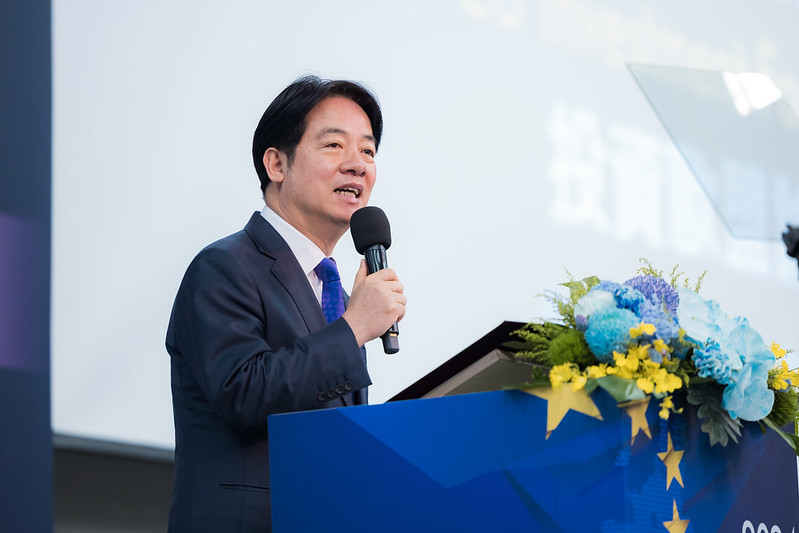
2024-11-18
President Lai attends 2024 EU Investment Forum
On the afternoon of November 18, President Lai Ching-te attended the opening of the 2024 European Union Investment Forum. In remarks at the ...
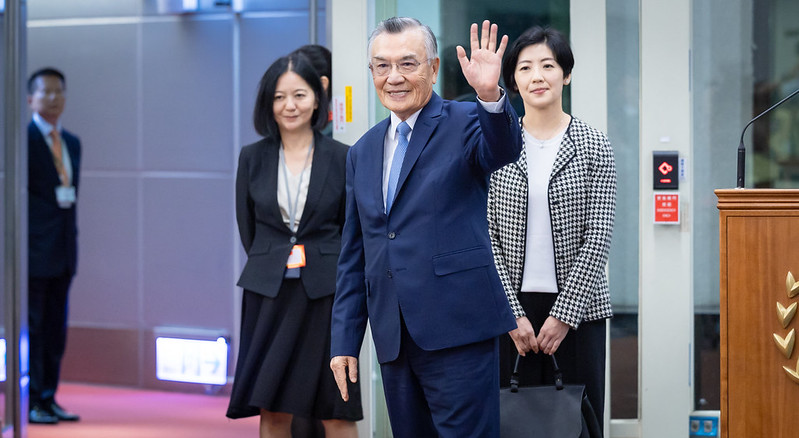
2024-11-12
APEC envoy Lin Hsin-i delivers remarks before departing for 2024 APEC Economic Leaders’ Meeting
On the evening of November 12, ahead of his departure for Peru to attend the 2024 APEC Economic Leaders’ Meeting (AELM) from November ...
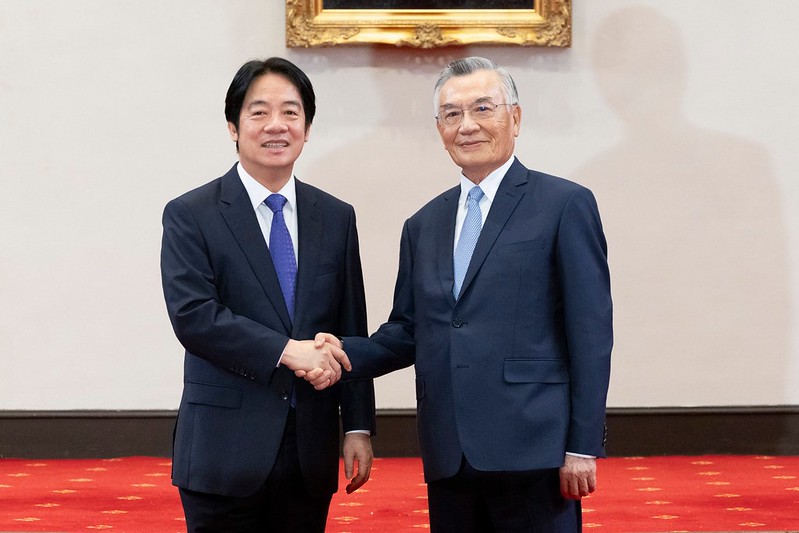
2024-11-07
President Lai attends press conference before Taiwan’s delegation departs for 2024 APEC Economic Leaders’ Meeting
On the morning of November 7, President Lai Ching-te attended a press conference before Taiwan’s delegation departs for the 2024 APEC ...
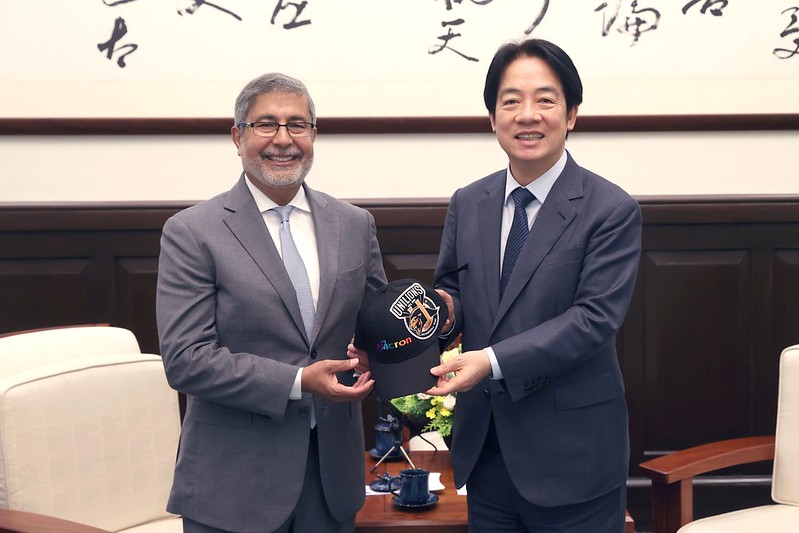
2024-07-12
President Lai meets Micron Technology delegation
On the morning of July 12, President Lai Ching-te met with a delegation from Micron Technology. In remarks, President Lai thanked Micron for...



